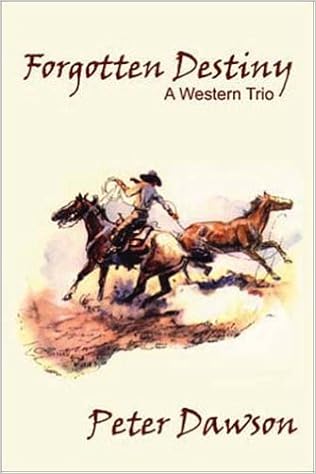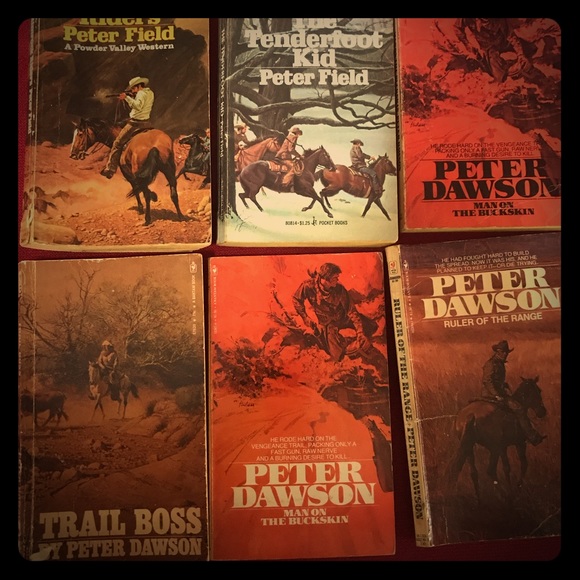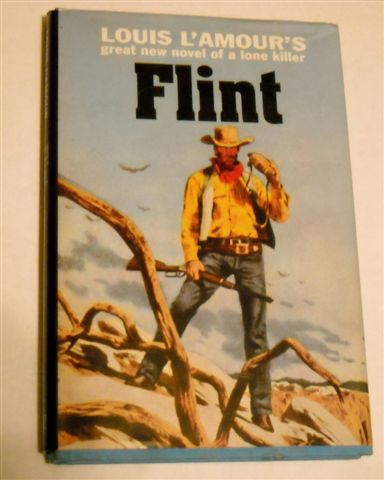Well, I said no more anthology reviews for a while. But a while has passed, and here we are again. I am just glad there are only three stories in this collection. The idea of writing about more than three tales is daunting!
Peter Dawson – real name Jonathan Glidden – was a pulp western writer in the 1930s and ‘40s. Though he was no Louis L’Amour, the three stories in this compilation prove the man could write. Each of the three novellas within this tome has a different cast of characters and a relatively unique plot. Yes, there are recognizable tropes or archetypes in these pieces, but that is part of what makes them appealing. Dawson did not fail to make his characters interesting or his plots intriguing. While I think L’Amour tends to do this better, the fact is that his stronger grasp of the Western might be due to his transcendental view of the Old West.
By this I mean that Louis L’Amour believed the Old West never died. No, we do not have gunslingers and greedy land-grabbers like those in the West of yesteryear. Yes, we cross the country in vehicles rather than by horse or horse and carriage. So what? The values that made the West such an exciting place still exist. In many places, the original settlers’ descendants continue to live and work on the land their ancestors’ paid for with cash, blood, sweat, and tears. How can such a legacy ever be truly erased?
Mr. Dawson’s writings lack this eternal view of the West. While not a detriment per se, they do make his stories feel…different. Speaking as a diehard Louis L’Amour fan, I know that I am always expecting that sense of the transcendental when I pick up Forgotten Destiny: A Western Trio. Not finding it is disappointing and tends to lower my enjoyment factor somewhat.
Nevertheless, A Western Trio is well worth reading. If ever this blogger stumbles upon some more works by Mr. Dawson, she will not be averse to picking them up. The man could write well and tell a darn good story. What more could a reader ask for?
All right, with those caveats out of the way it is time to get down to business. The first piece in this anthology is called “Brand of Luck.” Standing in front of his cabin, Hugh Conner glares down at the two men who have come to call. Having moved into the deserted building three months prior, Conner has worked hard to make the formerly desolate property his own.
The two men in front of him intend to change that fact. One of these two bullies is Wyatt Keyes, a man of ambition who has been buying up property in the area for reasons unknown. Just recently he bluffed the Chain Link outfit, the biggest in the area, into giving ten sections of good grazing ground over to him. Now he has come for Conner’s much smaller parcel of land, having already made offers on the land owned by the newcomer’s neighbors.

With Keyes is his sheriff, Mace Dow. Formerly the ramrod of Keyes’ Key-Bar ranch, the man is a lean, mean hombre who has been enforcing his boss’ will throughout the territory. Although Dow has clearly been drinking, this does not mean he is not dangerous – perhaps as treacherous as Keyes.
Watching the two settle their hands on their gun belts, Conner realizes they have ridden in to shoot it out. As a newcomer and, essentially, a squatter on this property, they believe they can get rid of him without too much trouble. It will be their word against his dead body, and who can ask a corpse which man shot first?
Luckily for Conner, at that moment a wild dog races past the cabin in pursuit of a jack rabbit. Seizing the opportunity to make the men back off, Conner kills the creature before it can catch the rabbit. He is so quick that Dow is left gaping and Keyes’ cannot hide his surprise. But while the two men are convinced that leaving is in their best interests, Conner knows they will return. He also knows that they will bring reinforcements. Dodging trouble on his back trail, Hugh figures his best bet is to cut his losses and leave the territory – now.
But he doesn’t intend to let Keyes’ have the satisfaction of knowing he drove him off his property. After packing his belongings, Conner sets his own house on fire moments before he leaves. On his way out, he meets the daughter of George Baird, owner of the Chain Link outfit. Disappointed that he would leave without helping them, she admits that she came out to convince his neighbors to vote for a new sheriff to replace Dow. Seeing her so depressed and wanting to help the woman who has been such a good friend to him, Conner comes up with a plan…
“Brand of Luck” is probably my favorite piece in this book. It has just enough twists and turns to be interesting, while still feeling like a traditional Western that the style doesn’t jar the reader out of the story. Even if the other novellas were bad, I think I could recommend the collection based on this installment alone.
Fortunately, the next two tales are also good. “Death Brings in the Ophir” starts in court. Nick Treacher is ordered by Judge Byron Morgan to close down the Ophir Mine until he can make the property conform to regulation standards.
Nick Treacher’s response is for the regulations and their enforcers to go pound sand.
The “representative” for the minority stockholders in the Ophir Mine, Sam Poole, instantly jumps to his feet. He claims that Treacher is in contempt of court. Nick corrects him, saying he has no contempt for the law or the court. He has contempt for Poole, who bought the judge and has finagled the owner of the Ophir into this mess.
Although he doesn’t want to do it, Judge Morgan orders Nick’s arrest and the sheriff moves to do so. But since he is fat and out of shape, while Treacher is young and in shape, the owner of the mine is able to outmaneuver him easily. Jumping through the court’s window before he can be grasped, he fires a warning shot through the aperture when Poole jogs up to it and tries to fire after him.
Outside Nick meets up with his old friend, a cowpuncher named Ed Wright, who has been guarding his horse while waiting on his own steed. As the two head back to the mine Nick explains that he has put every penny he has into the Ophir. Many believed it to be played out, but he has discovered that there is still an active vein of silver ore in the rock. He is hoping to make back his money and more on by carefully mining this vein.
Poole knows all of this. And he wants the potential millions it could deliver for himself. With Judge Morgan on his side, he now has the means of getting it.
Nick then springs a surprise on his friend, offering Ed a share in the mine if he will stay and help him keep the property. Surprised, gratified, and excited, Ed is quick to agree. The two reach the mine and alert the men to what has happened. Having hired as many of the roughest, toughest, but honest miners he could find, Nick has a small army guarding the Ophir.
These men are also working the mine, however. And since they cannot increase their numbers, they have to be canny and careful. Poole has resources and can hire as many gunhands as he wants to get the Ophir. With his subversion of the law giving him cover, he can attack the mine at any time in any way he deems fit and – probably – get away with it.
So Treacher, Wright, and the miners settle in for the long haul. When the sheriff trundles up to the Ophir that evening to serve a warrant on Treacher, everyone is ready for him. Nick, Ed, and the men capture him (an easy thing to do) and they decide to holdthe sheriff for a ransom of five thousand dollars. Nick believes he can use that money to stall Poole’s legal beagles long enough to beat the other man at his own game.
Thus Treacher gives Ed the ransom note as the sheriff is hustled off to a cabin, where he can be held until the cash is delivered. In town, Ed posts the ransom note and stays to judge the reaction. While waiting for the townsfolk to notice the poster, however, he comes up with a corollary to Nick’s plan that should help put Poole on defense – if it works…
“Death Brings in the Ophir” is a good entry. It is more convoluted than “Brand of Luck,” but remains an enjoyable yarn nonetheless. The action ramps up quickly, keeping the tension without sacrificing the believability of the tale. For some reason, the ending never ceases to make me think of the film The Unsinkable Molly Brown. (If you have seen that film – shhh! No spoilers! 😉 )

Finally, we have “Forgotten Destiny,” the story which gave this collection its title. Bill Duncan sets up camp in the desert a few miles from Halfway Springs. Four days ago he received a request for monetary aid from an old friend of his father. Though they have never met, Bill remembers his father speaking highly of one Tom Bostwick. And any friend of his father’s is a friend of Bill Duncan.
So he withdrew five thousand dollars from the bank and hightailed it for Halfway Springs. Now, less than a day away, he ponders what kind of trouble could force a man like Bostwick to ask for help. It would have to be big for him to request aid from his best friend and partner’s son. Worried, Bill stares into the fire, feeling the weight of the money belt around his waist.
Before he can turn in for the night, though, a shot rings out. Bill falls, apparently dead. A man walks up to him, taking the money belt and the horse. Then he leaves Bill for the vultures.
The next day, when Sheriff Ben Alcott is riding back into Halfway Springs, someone shoots at him. Diving for cover, Alcott finds himself face-to-face with a fevered, dehydrated stranger. The man passes out and collapses before he can fire again, giving the sheriff the opportunity to study him more closely. He has a head wound, one that isn’t deep but which has bled profusely.
Alcott brings the man in and sends for the doctor. Simultaneously, he tells someone to let his brother know he is back and wants to speak with him. During the brothers’ conversation, it is revealed that the two Alcotts are secretly trying to run Tom Bostwick off his property. They know Bill Duncan was bringing financial aid and, unbeknownst to his brother, Ben has seen to it that the money will not come through in time.
Or so he thinks. Not long after the doctor leaves, Ben’s deputy arrives with the cash. The younger man starts upon seeing the injured stranger in the jail. Frightened, he explains that the wounded man Sheriff Alcott brought in is the same one he wanted dead!
Things look bad for all concerned, until Bill wakes up with amnesia. Seeing an opportunity to get what he wants and keep Bill out of the way, Alcott decides to use him to capture Bostwick. Grateful for the help, Duncan is only too happy to oblige…
What follows is a rip-roaring good story that will leave a reader turning the pages. But you don’t need to take my word for it. Pick up Forgotten Destiny: A Western Trio, at your earliest convenience and see for yourself. Peter Dawson was not on L’Amour’s level, but he was a darn good writer. For that, he deserves to be remembered, readers.
‘Til next time, partners!
The Mithril Guardian

















